Client
Global direct sales company
Industry
Retail
Approach & target picture:
- Sound research to identify the driving factors for a successful community
- A comprehensive decision matrix evaluating relevant community solutions and characteristics
- A feasible and scalable solution with adaptability to all markets
Table of contents
A globally leading direct sales company with a multi-category product portfolio planned the launch of a new kitchen appliance coupled with additional services. The marketing department wanted to build a community around the new product-service system, enabling customers to share experiences, best practices and further insights.
The intention was to create additional business value by increasing customer satisfaction and loyalty on the one hand and attracting the attention and interest of potential new customers on the other. At the same time, it was crucial to harmonize this idea with the business model of the company – a direct-selling approach via independent sales representatives. To achieve a sustainable solution, it was crucial to bring in an expert with specialist knowledge as well as sensitivity to the needs of consumers and the client’s objectives.
When the client brought FELD M onboard, product development was already well advanced and a campaign for the product launch was being planned with the help of a communications agency. This plan referred to “the community” as an integral part of the customer experience without defining what “the community” would be: What features would it have? What content would be there? What was even meant by “community” in structural terms – an app, a Facebook group, an event series? And ultimately, what would be the value added for customers and for the sales representatives?
Additionally, the new product and its accompanying services were to be launched in several European markets simultaneously, making it imperative to take local and cultural preferences into account.
Our client needed a comprehensive decision basis and clear recommendations on how value adding communities should be designed and brought to life.
Our approach
After researching community concepts within and beyond the industry of our client we conducted in-depth user research in the two pilot markets. This included qualitative information gathering in the form of interviews as well as a quantitative survey. By evaluating the needs and wishes of customers and sales representatives captured in this manner, FELD M was able to identify drivers for involvement in communities.
Having started with online communities in mind, we soon discovered that there was potential for hybrid online/offline community models. Throughout the project, we accompanied the client with workshops to share research insights and knowledge about the communities. This ensured alignment with the clients’ various stakeholders. In open and trustful dialogue, we worked together toward a solution with broad support across our client’s organization. The resulting recommendation: a digital virtual community with an offline extension.

Decision matrix - user's perspective
Effective community design
Since product development was ongoing, not all elements of the community could be defined in detail. The solution FELD M developed was a comprehensive decision matrix that would enable the marketing management of our client to easily pick and choose relevant components to fit the finalized product.
The solution allows the client to make sound, fact-based decisions on the community design. The decision matrix we developed includes options to weigh certain factors and respond to changing requirements or altered priorities in the course of the ongoing product development. Detailed explanations of all factors within the decision matrix allow marketing management to develop a compelling line of argumentation for the chosen community design.
Have a similar project?
Let's find out together how we can help!
-
Consumer & user research
Automotive
User experience: not just the look, but how it works
-
Consumer & user research

Clear positioning in the new and growing online-only car market
-
Consumer & user research

Customer journey mapping for HORNBACH: Get in touch at all touchpoints
-
Consumer & user research
Insurance
Behind the scenes: User research for an online insurance claims reporting system
-
Consumer & user research
E-commerce
Quantitative study for a successful product launch


